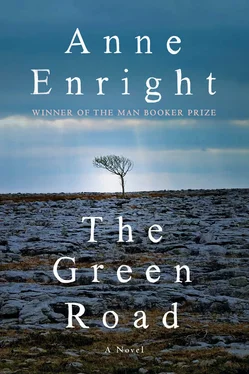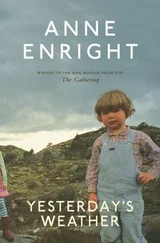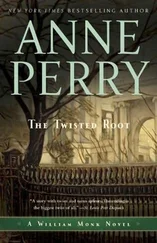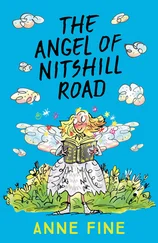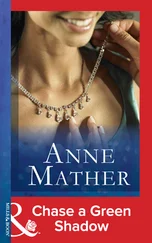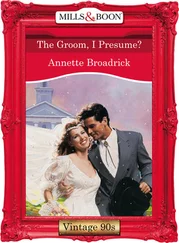‘Have you had enough, Desmond?’
Sometimes Constance felt she was actually in the way.
‘Cut him another slice of that cake, Constance. Will you have another slice of cake?’
Her mother would put her hand lightly to Dessie’s forearm, she would glance over her shoulder at him, with some backward-flung piece of charm. It was a hoot to watch the pair of them. Two drinks and they’d be off laughing in a corner: Dessie buttered up, plumped up, lifting the jacket on to her shoulders from the back of the chair, ‘You have to hand it to her’, as though Rosaleen was an opponent worth considering, for a man like Dessie. Then, as soon as he was through his own front door, saying, ‘That woman’, because she had played him, yet again.
Though she managed it less and less, it had to be said, since her own husband died.
Constance was very worried about Rosaleen. She was still out in the old house in Ardeevin and it was still letting in the rain, she had a hundred small things wrong with her, none of which you could name. This had always been the way with Rosaleen, but she went to some new quack in Ennis who told her not to eat broccoli, or to eat lots of broccoli, Constance could never remember which. The GP, meanwhile, said her bloods were coming back fine, so Rosaleen was fighting with the GP whom she had never liked — nor his father before him, she said. Everything was off. She was tired all the time.
The stupid thing was that if you agreed that there was, clearly, something wrong with her, Rosaleen would snap that she was perfectly fine. Or if, in the middle of some intense medical discussion, you suggested she get a scan of the offending organ, whichever one it was, then Rosaleen would look quietly affronted, because of course the thing that was wrong with her was not the sort of thing you could just see with a machine.
‘Oh, I don’t know,’ she would say, turning to look out the window, and a small smile would come, as though she enjoyed being so misunderstood.
Constance did not think there was a cure for grief, but she did think an anti-depressant might cut the worst of it. She was on a little Seroxat herself, since her father got sick and she wouldn’t be without it, but it was not something you could ever suggest to your mother.
Daddy said he felt fine.
‘I feel absolutely fine,’ he had said. Twelve months and two courses of chemo later, he was dead. So a healthy man was in the ground, and a woman who felt mysteriously unwell was driving about the countryside, switching on the windscreen wipers every time she wanted to turn left. Coming home, then, to a house that was falling down around her ears.
Dessie wanted to develop a site out at Boolavaun, that was one of the things Rosaleen teased him about, he had some scheme. He would get the cash to her, and Rosaleen would sign the land over — he would buy it, in effect — and the money would plug the holes in her roof and keep her in nice skin cream. But Rosaleen seemed to like the holes in her roof. She seemed to like saying, ‘What will I do? I don’t know what to do.’ She liked panicking with pots and buckets and having them all run around for her, calling Constance every time it rained. Calling Constance when the mousetrap went off, saying, ‘I think it’s a rat.’
Constance who had cancer. Or who did not have cancer.
What was the word she was looking for?
‘No.’
What do you mean, ‘No’?
‘No, I am busy. No, I have more important things on. No, I will not do this for you now. No.’
‘Margaret Dolan!’
The woman beside Constance lunged towards the floor to gather her basket and her bag and her empty water bottle, and her gown opened to show her back, which was creamy and huge. Constance had the urge to touch it. She wanted to lay her head on the expanse of it, say, ‘Stop. Hush.’ And when Margaret Dolan paused, she would reach down to take her scarred and pudgy hand, and feel her own hand squeezed in return.
‘OK,’ said Margaret Dolan and she heaved herself, with some difficulty, up off the seat.
‘Well,’ she said, turning slightly to Constance. ‘Here goes nothin’!’
‘Take it easy now,’ said Constance.
The empty space she left behind was still occupied by the sharp, peculiar smell of her sweat.
‘Keep drinking the water!’ said Constance, at the last minute, just before the door closed, and the woman from Adare shot a small glance her way.
It was true.
All Constance wanted to do was to make people happy. Why was it her job to fix them? Not one of the people she cared so much about knew where she was, right now. There wasn’t a sinner to remember that she had a mammogram today, or enquire how it had gone, and a terrible sharp desire came over Constance to be told the lump was malignant, so she could say to Dessie, ‘You know where I was this morning?’ and tell her mother, ‘Yes Mammy, cancer, they saw it on the scan’, then wait for the news to filter, finally, through to Lauren, Eileen, Martha Hingerty: who would then be obliged to call, ‘Why didn’t you tell me? I just heard.’
There it was.
She was in the room and there it was: a picture of her breast was pinned on to a light-box on the wall and, on her breast, which was a network of white lines and intersections, was a lump: it looked like a knot, a snarl of light. And everything around it — the exterior line of the breast, the map of ducts, or veins, perhaps — was very beautiful, like a landscape seen from space, one of those pictures of the earth taken at night.
But there might have been an arrow pointing to the thing. There might as well have been a big stick-on piece of cardboard with the word CANCER written on it in red marker, because even Constance could see it, there was no doubt it was there. It was a while before she could look away from it and listen to what the doctor was saying.
‘You’re a bit old for one and a bit young for the other, if you know what I mean.’
Was that good?
Constance was lying on the couch. The doctor, who was a woman, had the sonic pen Constance remembered from her pregnancies, and she thought she heard the liquid boom of a baby’s heart through the Doppler machine. Then she realised it was the sound of her own blood, rushing in the flesh of her ears.
The doctor looked to the picture on the light-box, and felt — unerring — for the lump. She moved her index finger around it, while her other hand brought the pen into play and the screen beside Constance jumped into life. The picture was in black and white, and this time the inside of her breast looked like marble, it was mottled in exactly the same way. It was marbled the way a steak was marbled, she thought, because what she was looking at was fat. Before she knew what was happening, the woman had a needle in there — too fine, almost, to hurt, she could see it on the screen reaching into a blob of darkness, and she looked down in real life as it was taken out, and she realised a nurse was holding her by the shoulders so she would not make any sudden movement. As soon as the needle was gone she wanted to sit up and take a breath, and this is what she did. She was wiping the jelly off her skin with some rough green paper towel, she was reaching for the basket of clothes as the doctor said, ‘Hang on.’ Then the doctor repeated what she had just said. Some word like ‘adenoids’ or ‘carcinoma’ and then: ‘I think — hang on — So I am ninety-five per cent — OK? — ninety-five per cent sure this is what it is. And you are a bit old for it, but you’re a bit young for the other, all right? With your history, and what I am seeing here on the screen.’
Constance still couldn’t understand a word of it. This is why everyone took so long in this room. It was because everyone was stupid, like her.
Читать дальше
